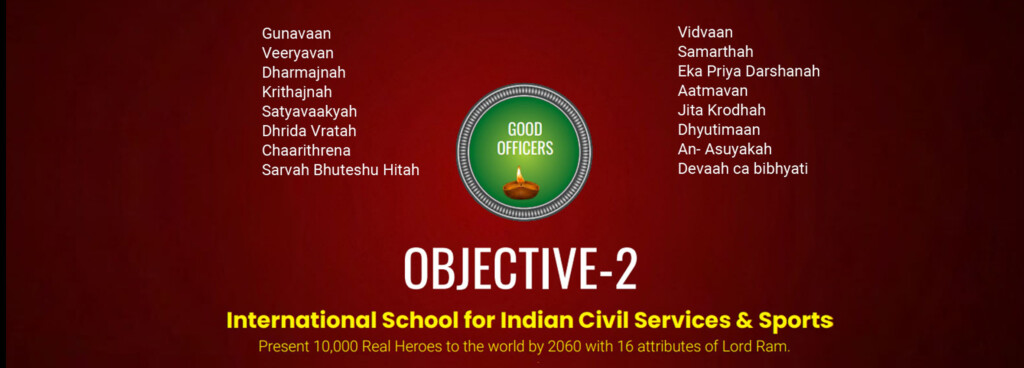
International School for Indian Civil Services & Sports
There is a scarcity of individuals who can serve as role models in contemporary society. Without these role models in the public eye, fostering good citizenship becomes a daunting task. Therefore, our aim is to replicate the virtues of Rama and produce 10,000 exceptional young individuals with deep wisdom through our Objective-2: “The International School for Civil Services & Sports”.
The lack of moral standards in the top officials is hampering the nations progress. The lack of values and ethics in leaders and bureaucrats worldwide contributes to the numerous issues we witness today. They’re more concerned with their own agendas or personal gain than making decisions that benefit all of us. Instead of having integrity and putting the needs of the people first, it feels like they’re just looking out for themselves. And that can lead to corruption, inequality, and just a general sense of distrust among the public. We need honest, compassionate leaders committed to doing what’s right, regardless of personal gain.
Concept and Idea
It is indeed possible to cultivate the qualities and character traits of someone you admire by consistently observing and listening to them. By doing so, you can aspire to become like them. You can understand how they navigated their life by closely observing or reading about the individual and analyzing their behaviours, thought processes, and reactions to various situations. Once you know their mannerisms and personality traits, you can start incorporating them into your daily routine. We know very well that embodying someone else’s character takes time and effort. Still, with patience and determination, one can strive to become the best version of themselves, inspired by those they admire. This requires severe practice if practiced at a late young age as ones character will be unwilling to adopt or change because of frozen and rigid mindset. But, if the same is done right from the Age of 5, one can effortlessly morph into their role model and can dislay extradinary character all through their life.
Considering the above facts, an intriguing idea was born, and we have firmly resolved to present it before you and seek your blessings and involvement for implementing it.
Why we chose to clone King Rama?
King Rama is often hailed as the embodiment of virtue and righteousness. His character is revered for its unwavering commitment to Dharma (righteousness) and his ability to make decisions based on moral principles rather than personal gain. Throughout ancient texts like the Ramayana, King Rama is depicted as a just and noble ruler who always puts the well-being of his people above all else. His actions serve as a guiding light for others to follow, showcasing traits like selflessness, compassion, and integrity. In a world filled with individuals driven by selfish motives, King Rama stands out as a beacon of true character and moral fortitude that is unmatched by any other being in existence.
So, Imagine a world where we could produce 10,000 clones of Rama in the coming 30 years, a figure revered as an embodiment of righteous living. The potential impact on global peace could be enormous. With each clone embodying the teachings of Rama – love, kindness, and compassion – there would be a common ground for people of different faiths to come together and find harmony. Religious wars often stem from misunderstanding, fear, and differences in beliefs. But with Rama clones spreading his message of tolerance and acceptance, these barriers could begin to break down. It’s not a perfect solution, but it’s an intriguing concept that shows the power of unity in diversity and the potential for religious harmony in our world today.
Gift 10,000 Ram-like bureaucrats to the world.
Our secondary objective is to provide 16 years of education to orphans from different regions of India by establishing a residential campus. The school is set to begin with a capacity of 960 students, with 60 students graduating annually. These students’ education expenses will be sponsored by 960 generous individuals nationwide. We wish to dedicate 600 Graduates to India every year. Therefore, we plan to increase the capacity tenfold in the next decade. These 600 graduates will receive professional training to participate in the Olympic games, Master Ramayana and Bhagavad Gita and positive aspects from all other religious texts, learn martial arts, and more, primarily focusing on securing success in the 400+ IAS and IPS job opportunities announced yearly.
The Impact of our Graduates.
Our graduates, armed with the highest understanding of the Bhagavad Gita, Ramayana, Positive aspects of all other religious texts, Martial arts, Sports, and more, will not only be the pillars of our society but also the harbingers of change. They will be instilled with integrity, service, and dedication, ready to win over the 400+ IAS and IPS job opportunities notified every year in India. Their success will not just be personal but will also reflect the noble cause of our school, inspiring hope and optimism for a non-corrupt, Developed India and a peaceful world. This noble cause inspires and motivates us to put forward such a gigantic project.
Our students will imbibe the ancient Sanatan heritage.
We have made a firm resolution to add the study of ancient Hindu scriptures and moral tales to the curriculum for all students. This will include the Bhagavad Gita along with our Itihasas Ramayana and Mahabharatam. Studying these epic and philosophical dialogues will give students a deeper understanding of the characters and the morals vital to understanding the principles of Karma and Dharma that direct the journey of our souls. Teachers will guide students through these ancient texts’ complex narratives and themes. Students will reflect on duty, action, and purpose by reading the dialogue between Krishna and Arjuna in the Bhagavad Gita. They will learn about morality, loyalty, and righteousness through the grand stories of Rama and Sita in the Ramayana and the Pandavas and Kauravas in the Mahabharata. These texts are rich in metaphor and require a nuanced reading to appreciate fully. In addition to these canonical works, students will study the moral fables and animal tales written by Vishnu Sharma, collectively known as the Panchatantra. These lively stories feature animal protagonists and simple plots that illustrate principles of wise living. Students will enjoy these creative tales while absorbing more profound wisdom about speaking, acting, and thinking virtuously. Studying this body of important Hindu literature will give our students a strong foundation in their cultural heritage and timeless ethical principles. They will learn critical lessons about dharma, karma, and the path to enlightenment while connecting to some of the most renowned stories and characters in Indian tradition. This will enrich their education and provide valuable historical, philosophical, and moral context.
Why Indian Civil Services only?
The Indian Administrative Service (IAS) and Indian Police Service (IPS) are India’s most prestigious and influential government services. They are responsible for administering policies, implementing government programs, overseeing law and order, and maintaining the bureaucracy that keeps the country running. However, corruption and lack of discipline among some officers have hampered efficiency and progress. It will transform the system if every IAS and IPS officer exemplifies strict, disciplined and non-corrupt qualities. Strictness ensures rules are followed, and no one gets special favours or breaks laws. Discipline leads to timely execution of duties, adherence to processes and no laziness. A complete absence of corruption ensures public funds are not misused for private gain, and citizens are treated fairly. This level of integrity and professionalism across the board would enable good governance.
It would lead to effective delivery of services, successful development programs, robust infrastructure, increased foreign investment, and growth in critical sectors like manufacturing and technology. A disciplined bureaucracy and police force would drastically reduce red tape, bureaucracy, delays and inefficiencies. This would spur faster economic growth and social progress. Law and order would improve, leading to lower crime rates and a safer society. The nation would progress rapidly with every able officer sincerely doing their duty. Talent and skills would be optimally utilized. This efficiency and public trust in government institutions would propel the country into a developed nation and global superpower in the coming decades. It may seem an impossible ideal, but bringing in higher quality recruits, better training and incentives can transform the services. If India’s top civil servants and police officials live up to the highest standards of public service, the ripple effects can enable India to rise as a superpower.
10,000 RAMS CAN NOT ONLY MAKE INDIA, A SUPER POWER, BUT CAN ALSO MAKE THE WORLD PEACEFUL
If all the IAS and IPS officers in India were to embody the virtues of Lord Rama, the country could undoubtedly ascend to superpower status in a short span of time. Lord Rama symbolizes integrity, wisdom, bravery, and righteousness. His exceptional leadership skills are unmatched, and if our civil servants were to follow his example, they could significantly impact the nation. By prioritizing honesty, dedication, selflessness, and integrity in their work, these officers could revolutionize governance and administration in India. This shift could result in a more transparent and accountable system, where decisions are made for the greater good rather than personal gain. They would earn the trust and confidence of the people, contributing to the nation’s collective prosperity. Moreover, a focus on justice and fairness could lead to a decrease in corruption and an increase in trust in governmental institutions. By embracing these qualities, India could soar to new heights and establish itself as a global powerhouse.
We aim to instil dharmic principles from the pyramid’s base to the summit.
The path to India’s success lies in its people upholding their dharmic duty. The ancient wisdom of the Bhagavad Gita can guide all sections of society towards righteous action. The nation prospers when citizens follow dharma, conducting themselves with integrity, compassion and self-discipline. When politicians lead with wisdom, integrity, and service to others, policies uplift people. When officers enforce laws justly and without corruption, safety and justice prevail. Yet greed, hatred, and selfishness often corrupt people’s conduct. The Gita explains how disciplining the mind and transcending selfish desires enables one to act for the greater good. Its teachings on selfless service, devotion to duty, and equanimity empower people to overcome their egos and see themselves as instruments of a higher purpose. If the lofty wisdom of the Gita permeated all levels of Indian society, it would inspire people to live up to their full potential.

